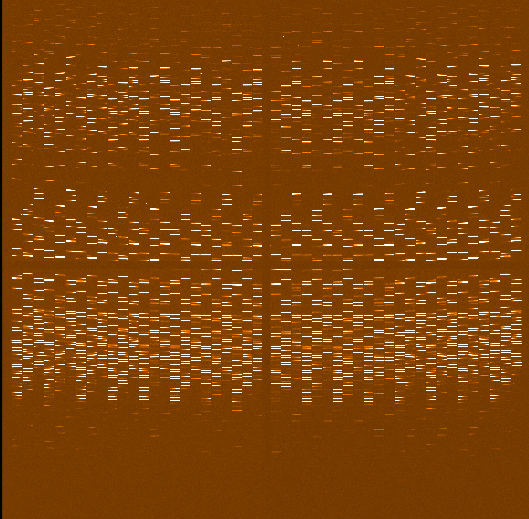 mirror sites:
PL (internal link)
HQ
[?]
mirror sites:
PL (internal link)
HQ
[?]
Quality Control and
Data Processing
|
MUSE: Wavelength solution and resolution
Arc lamp calibrations are taken regularly in one instrumental setup: INS.MODE=WFM-NOAO-N, INS.OPTI1.NAME=Blue, DET.READ.CURNMAE=SCI1.0. Each set of wavelength calibrations consists of fifteen input raw frames (multiple of 3) from different arc lamps: Ne, Xe, and HgCd (5 input frames per lamp). Whenever science observations are executed in a different instrumental setup, the corresponding arc lamp frames are taken as well, e.g, in the AO (Adaptive Optics) mode.
 Resolution and Central Wavelength
Resolution and Central Wavelength
The spectral resolution averaged across all detectors (CHANELs), including rms, is monitored for central slice24 and border slice1. We monitor it separately for the data taken in the WFM, Nominal and Extended modes (both NOAO and AO). Also, the resolution is monitored for each detector. Only data taken in the read-out mode (DET.READ.CURNAME) SCI1.0 are selected. Scoring&thresholds Resolution and Central Wavelength
The thresholds are used for the HC settings - the wavelength calibrations taken in the WFM-NOAO-N and WFM-NOAO-E modes. The lower thresholds for resolution are relatively tight to be sensitive to a sudden degradation. The central wavelength is very stable in general, so the thresholds are not so tight to avoid false alarms.
Algorithm Resolution and Central Wavelength
To compute the wavelength solution, arc lines are detected at the center of each slice (using threshold detection on a S/N image) and subsequently assigned wavelengths, using pattern matching to identify lines from the input line catalog. Each line is then traced to the edges of the slice, using Gaussian centering in each CCD column. The Gaussians not only yield center, but also centering error, and line properties (e.g. FWHM).  Wavelength Calibration Fit
Wavelength Calibration Fit
The number of identified arc lines used in calibration solution fit, as well as the fit rms, averaged across all detectors (CHANELs), is monitored for central slice24 and border slice1. The parameters are followed as a function of time and as a function of ambient temperature (INS.TEMP4.VAL, qc parameter "temp_ambient"). Only data taken in the WFM-NOAO-N, WFM-NOAO-E modes and read-out mode (DET.READ.CURNAME) SCI1.0 are selected. Scoring&thresholds Wavelength Calibration Fit
The thresholds are used for the Health Check settings - the wavelength calibrations taken in the WFM-NOAO-N and WFM-NOAO-E modes. The lower thresholds for number of arc lines used in the fit are relatively tight to be sensitive to a sudden degradation.
Algorithm Wavelength Calibration Fit
To compute the wavelength solution, arc lines are detected at the center of each slice (using threshold detection on a S/N image) and subsequently assigned wavelengths, using pattern matching to identify lines from the input line catalog.  Flux of the Arc Lines
Flux of the Arc Lines
Flux of each wavelength calibration lamp, of the Ne, Xe, and HgCd lamp is monitored.
We monitor flux of each MUSE arc lamp: Ne, Xe, and HgCd, in selected slice20, averaged across all IFUs. It is in units of electrons (due to FITS standard regulations 'counts' is used instead). Scoring&thresholds Flux of the Arc Lines
The thresholds are used only for the lamp_peak_max parameters. The upper limit is set to warn of possible saturation of the arc lines. Although good indicator of the flux extrema, this parameter may not always be sensitive enough. Since the median tries to discard all bad (saturated pixels, i.e. with raw ADU>65500) and the image combination of the 15 exposures has done the same before, it's much less likely to contain (near-)saturated pixels. Also, often lines are not saturated over the whole width, because of the poor sampling on the CCD, and so values ~8000 counts below the 65500 limit naturally occur, even when lines are saturated. And finally, the saturation may occur in different slice than slice20 (probably has to do with the graded AR coating of the CCD and the resulting sensitivity to a given wavelength).
Algorithm Flux of the Arc Lines
The maximum flux is defined as a peak of all lines in a given lamp, in a spectrum that is a median of the three middle CCD rows of slice20. |
|||||||||||||||||||||||||||||||||||||||||||||||||||||||||||||||||||||||||||||||||||||||||||||||||||||||||||||||||||||||||||||||||||||||||||||||||||||||||||||||||||||||||||||||||||||||||||||||||||||||||||||||||||||||||||||||||||||||||||||||||||||||||||||||||||||||||||||||||||||||||||||||||||||||||||||||||||||||||||||||||||||||||||||||||||||||||||||||||||||||||||||||||||||||||||||||||||||||||||||||||||||||||||||||||||||||||||||||||||||||||||||||||||||||||||||||||||||||||||||||||||||||||||||||||||||||||||||||||||||||||||||||||||||||||||||||||||||||||||||||||||||||||||||||||||||||||||||||||||||||||||||||||
| |
||||||||||||||||||||||||||||||||||||||||||||||||||||||||||||||||||||||||||||||||||||||||||||||||||||||||||||||||||||||||||||||||||||||||||||||||||||||||||||||||||||||||||||||||||||||||||||||||||||||||||||||||||||||||||||||||||||||||||||||||||||||||||||||||||||||||||||||||||||||||||||||||||||||||||||||||||||||||||||||||||||||||||||||||||||||||||||||||||||||||||||||||||||||||||||||||||||||||||||||||||||||||||||||||||||||||||||||||||||||||||||||||||||||||||||||||||||||||||||||||||||||||||||||||||||||||||||||||||||||||||||||||||||||||||||||||||||||||||||||||||||||||||||||||||||||||||||||||||||||||||||||||||
 |
|
|||||||||||||||||||||||||||||||||||||||||||||||||||||||||||||||||||||||||||||||||||||||||||||||||||||||||||||||||||||||||||||||||||||||||||||||||||||||||||||||||||||||||||||||||||||||||||||||||||||||||||||||||||||||||||||||||||||||||||||||||||||||||||||||||||||||||||||||||||||||||||||||||||||||||||||||||||||||||||||||||||||||||||||||||||||||||||||||||||||||||||||||||||||||||||||||||||||||||||||||||||||||||||||||||||||||||||||||||||||||||||||||||||||||||||||||||||||||||||||||||||||||||||||||||||||||||||||||||||||||||||||||||||||||||||||||||||||||||||||||||||||||||||||||||||||||||||||||||||||||||||||||||
